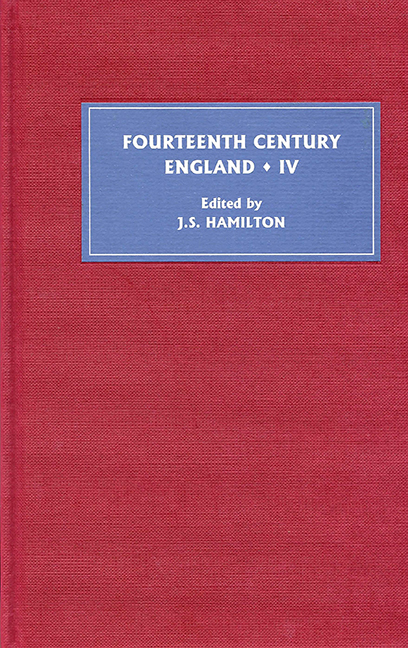Book contents
- Frontmatter
- Contents
- List of Illustrations
- Contributors
- Preface
- Abbreviations
- Who was St Thomas of Lancaster? New Manuscript Evidence
- ‘Hedging, Ditching and Other Improper Occupations’: Royal Landscapes and their Meaning under Edward II and Edward III
- Paying for the Wedding: Edward III as Fundraiser, 1332–3
- The Politics of Privilege: Thomas Hatfield and the Palatinate of Durham, 1345–81
- Agnes Maltravers (d. 1375) and her Husband John (d. 1364): Rebel Wives, Separate Lives, and Conjugal Visits in Later Medieval England
- Gendering Pastoral Care: John Mirk and his Instructions for Parish Priests
- Prosecution of the Statutes of Provisors and Premunire in the King's Bench, 1377–1394
- ‘Mercy and Truth Preserve the King’: Richard II's Use of the Royal Pardon in 1397 and 1398
- Aliens in the Pardons of Richard II
- ‘Too Flattering Sweet to be Substantial’? The Last Months of Thomas, Lord Despenser
- ‘O Prince, Desyre to be Honourable’: The Deposition of Richard II and Mirrors for Princes
- Regional Politics, Landed Society and the Coal Industry in North-East England, 1350–1430
The Politics of Privilege: Thomas Hatfield and the Palatinate of Durham, 1345–81
Published online by Cambridge University Press: 12 September 2017
- Frontmatter
- Contents
- List of Illustrations
- Contributors
- Preface
- Abbreviations
- Who was St Thomas of Lancaster? New Manuscript Evidence
- ‘Hedging, Ditching and Other Improper Occupations’: Royal Landscapes and their Meaning under Edward II and Edward III
- Paying for the Wedding: Edward III as Fundraiser, 1332–3
- The Politics of Privilege: Thomas Hatfield and the Palatinate of Durham, 1345–81
- Agnes Maltravers (d. 1375) and her Husband John (d. 1364): Rebel Wives, Separate Lives, and Conjugal Visits in Later Medieval England
- Gendering Pastoral Care: John Mirk and his Instructions for Parish Priests
- Prosecution of the Statutes of Provisors and Premunire in the King's Bench, 1377–1394
- ‘Mercy and Truth Preserve the King’: Richard II's Use of the Royal Pardon in 1397 and 1398
- Aliens in the Pardons of Richard II
- ‘Too Flattering Sweet to be Substantial’? The Last Months of Thomas, Lord Despenser
- ‘O Prince, Desyre to be Honourable’: The Deposition of Richard II and Mirrors for Princes
- Regional Politics, Landed Society and the Coal Industry in North-East England, 1350–1430
Summary
On 22 September 1375 Pope Gregory XI granted the newly appointed archbishop of York, Alexander Neville, special permission to conduct a visitation of the city and diocese of Durham and to impose the ‘usual procurations’ (the hospitality traditionally received by a bishop in the course of his visitation from the churches visited), without first completing the visitation of his own city and diocese of York, as was prescribed by canon law. The tensions arising from Durham's subordinate position as a suffragan see of the diocese of York had frequently crystallized on the issue of the right of visitation, which York claimed to enjoy by virtue of its metropolitan status and from which Durham sought to maintain its autonomy. Thus it was that in 1286 an agreement had been reached according to which the archbishop of York was allowed to conduct a visitation only during a vacancy of the diocese of Durham. Yet if this accord provided the basis of a reasonable working relationship between the two episcopal authorities, the more fundamental issue of the precise constitutional relationship between Durham and York remained a continuing and unresolved source of conflict, which was exacerbated by the elevation of Thomas Hatfield to the see of Durham in 1345. Three years after his arrival in Durham, Hatfield successfully petitioned for a papal bull which, in releasing the bishop and his officials from the censure of excommunication, suspension or interdiction by the archbishop of York, effectively removed the bishop of Durham from archiepiscopal control. It is not, then, surprising that, upon his appointment to the archdiocese of York in 1374, Alexander Neville should seek to reassert York's superior status as the metropolitan see by gaining papal approval to annul the earlier papal indult, the very existence of which, Neville alleged, Hatfield had used to do ‘many things worthy of correction’, and to undertake the first metropolitan visitation of the diocese of Durham during the pontificate of an incumbent bishop since 1281. Hatfield's response, upon hearing news of Neville's proposed visitation, was to petition the king for assistance, probably during the Good Parliament of 1376.
- Type
- Chapter
- Information
- Fourteenth Century England IV , pp. 61 - 79Publisher: Boydell & BrewerPrint publication year: 2006

